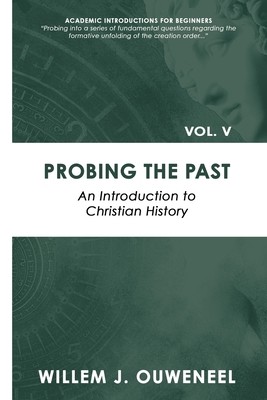
- We will send in 10–14 business days.
- Author: Willem J Ouweneel
- Publisher: Paideia Press
- ISBN-10: 0888152930
- ISBN-13: 9780888152930
- Format: 15.2 x 22.9 x 1.2 cm, minkšti viršeliai
- Language: English
- SAVE -10% with code: EXTRA
Reviews
Description
Probing the Past is the fifth volume in the series Academic Introductions for Beginners which has so far addressed Philosophy, Politics, Theology, and Psychology. The present volume probes into a series of fundamental questions regarding the formative unfolding of the creation order. Beginning with the question of how to properly characterize history, Ouweneel goes on to ask about the "meaning" of history; can we discern distinctive "patterns" or "epochs" in history; how should we understand God's "providence" in history; and finally how does "the Kingdom of God" relate to the empirical unfolding of what is commonly called "world history"?
"History is never just a recording of the mere facts, apart from the question whether such things exist in the first place. As I have explained in my Wisdom for Thinkers, facts are always facts-for-people; they are always contextually delineated. As far as we can ascertain, the Greek historian Thucydides (c. 460 - c. 395 BC) was the first, other than his somewhat older contemporary Herodotus (c. 484 - 425 BC), who attempted to limit himself to 'the facts.' However, both the choice and the representation of 'relevant' facts means that the historian has to develop some ideas, not only about the when, where, and how of history but also about the why." - From the Introduction
EXTRA 10 % discount with code: EXTRA
The promotion ends in 22d.07:22:01
The discount code is valid when purchasing from 10 €. Discounts do not stack.
- Author: Willem J Ouweneel
- Publisher: Paideia Press
- ISBN-10: 0888152930
- ISBN-13: 9780888152930
- Format: 15.2 x 22.9 x 1.2 cm, minkšti viršeliai
- Language: English English
Probing the Past is the fifth volume in the series Academic Introductions for Beginners which has so far addressed Philosophy, Politics, Theology, and Psychology. The present volume probes into a series of fundamental questions regarding the formative unfolding of the creation order. Beginning with the question of how to properly characterize history, Ouweneel goes on to ask about the "meaning" of history; can we discern distinctive "patterns" or "epochs" in history; how should we understand God's "providence" in history; and finally how does "the Kingdom of God" relate to the empirical unfolding of what is commonly called "world history"?
"History is never just a recording of the mere facts, apart from the question whether such things exist in the first place. As I have explained in my Wisdom for Thinkers, facts are always facts-for-people; they are always contextually delineated. As far as we can ascertain, the Greek historian Thucydides (c. 460 - c. 395 BC) was the first, other than his somewhat older contemporary Herodotus (c. 484 - 425 BC), who attempted to limit himself to 'the facts.' However, both the choice and the representation of 'relevant' facts means that the historian has to develop some ideas, not only about the when, where, and how of history but also about the why." - From the Introduction


Reviews